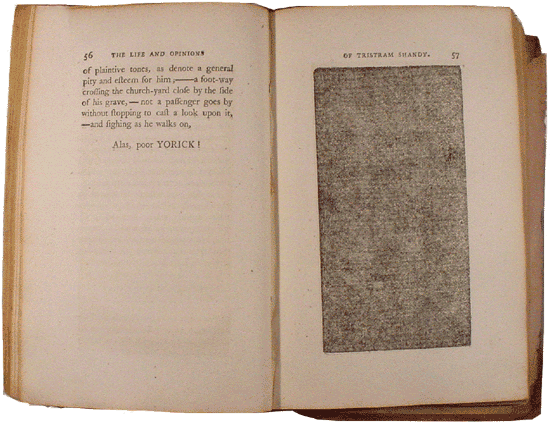
"Alas, poor YORICK!": The "Black Page"
in The Life and Opinions of Tristram Shandy, Gentleman.
 |
| Reproduced from Laurence Sterne, The Life and Opinions of Tristram Shandy, Gentleman (1759-67), in The Works of Laurence Sterne. In Ten Volumes Complete. (London, 1793) 56-57. |
Laurence Sterne's The Life and Opinions of Tristram Shandy, Gentleman (1759-1767) made extensive use of special typographical features and engravings particularly specified by the author (as typographical features in eighteenth-century works frequently were not); his idiosyncratic employment of dashes, unusual marks of punctuation, and specially-designed plates seems to have been intended to fulfil a number of purposes. In addition to contributing the novel's contemporary repute as an "odd" or "eccentric" work, these features also tended, by their very oddity, to foreground the artificiality of Sterne's chosen medium. The use of such visual features to communicate what cannot, apparently, be expressed through conventional literary language, is another means by which Sterne highlights the inadequacy of the "novel" as a representation of "real" life. Much of the "oddity" and humour of Tristram Shandy derives from moments such as these, when Tristram playfully parodies, violates, or explores the conventional forms of the novel.
Yorick's death scene here is important in the context both of this novel, and of the development of the form itself, for other reasons as well. Within the context of Tristram Shandy itself, the scene establishes the death of one of the more visible and important characters in the novel within the first 70 or so pages of first volume; it can do so, in part, because Tristram Shandy features a sliding and irregular narrative that skips, sometimes with bewildering speed, back and forth through time.
Part of the point — and poignancy — of Yorick's death resides in the autobiographical link between Sterne's character and himself. Although Sterne is frequently identified with Tristram himself, he is also, in many ways, Yorick; indeed, Sterne's own sermons were published as The Sermons of Yorick. Like Yorick, too, Sterne's progress in the Church had been badly damaged by a highly political conflict of the sort described here, early in his career. Sterne's imagining here of his own "death" is not just a case of excessive morbidity: Sterne suffered from pulmonary tuberculosis (as does Tristram), and, while he remained optimistic always in his continual struggle with the disease, he knew that he would one day, and sooner rather than later, succumb to it.
Although it may now seem occasionally melodramatic in its description of Yorick's end, the death scene here was much admired by contemporary readers, and it stands as a relatively early example of the kind of "sentimental" narrative that was to become very much the vogue later in the century. (It is worth notiing, however, that there is a certain strain of irony and even humour in Sterne's scene). Such scenes were designed to evoke strong emotional reactions in the readers, who would, by this means, form an empathetic bond with the character who had raised these emotions. The desired end of these emotions was — as is nearly always the case with eighteenth-century literature — moral: empathy through emotion, it was thought, would help "train" the readers' emotions to "feel" the distresses of others, making them, in the process, more compassionate and morally involved. In practice, and as later critics of sentimentalism tended to note, however, "sentiment" became an end in itself, and the "enjoyment" of intense emotional reaction frequently shaded into voyeurism or a kind of emotional masturbation.
This, in fact, is one of the points that Sterne makes in his last novel, A Sentimental Journey, which features Yorick as its narrator and main protagonist. Although Yorick is unquestionably a sympathetic character, and his sentimental attachments are an expression of his fundamentally moral character, he is not infrequently seen pursuing "feeling" as though it were a commodity to be collected and enjoyed, rather than an impulse to be acted upon in a moral manner. Significantly, Yorick's own death scene in Tristram Shandy would have had a marked "sentimental" impact upon readings of A Sentimental Journey; it would, one imagines, be almost impossible for contemporaries to have read this last work without being affected by the awareness that they had already "witnessed" the affecting death of Yorick himself some 10 years earlier. To this may be added the effect produced by the knowledge that Sterne himself had died just prior to the publication of A Sentimental Journey.
|
A few hours before Yorick breath'd his last, Eugenius stept in with an intent to take his last sight and last farewell of him: Upon his drawing Yorick's curtain, and asking how he felt himself, Yorick, looking up in his face, took hold of his hand,—and, after thanking him /[Page 68]/ for the many tokens of his friendship to him, for which, he said, if it was their fate to meet hereafter,—he would thank him again and again.—He told him, he was within a few hours of giving his enemies the slip for ever.—I hope not, answered Eugenius, with tears trickling down his cheeks, and with the tenderest tone that ever man spoke,—I hope not, Yorick, said he.—Yorick replied, with a look up, and a gentle squeeze of Eugenius's hand, and that was all,—but it cut Eugenius to his heart.—Come,—come, Yorick, quoth Eugenius, wiping his eyes, and summoning up the man within him,—my dear lad, be comforted,—let not all thy spirits and fortitude forsake thee at this crisis when thou most wants them;——who knows what resources are in store, and what the power of God may yet do for thee? ——Yorick /[Page 69]/ laid his hand upon his heart, and gently shook his head;—for my part, continued Eugenius, crying bitterly as he uttered the words,—I declare I know not, Yorick, how to part with thee,——and would gladly flatter my hopes, added Eugenius, chearing up his voice, that there is still enough left of thee to make a bishop,—and that I may live to see it.——I beseech thee, Eugenius, quoth Yorick, taking off his night-cap as well as he could with his left hand,——his right being still grasped close in that of Eugenius,——I beseech thee to take a view of my head.—I see nothing that ails it, replied Eugenius. Then, alas! my friend, said Yorick, let me tell you, that 'tis so bruised and mis-shapen'd with the blows which ***** and *****, and some others have so unhandsomely given me in the dark, that I might say /[Page 70]/ with Sancho Pança, that should I recover, and "Mitres thereupon be suffer'd to rain down from heaven as thick as hail, not one of 'em would fit it."——Yorick's last breath was hanging upon his trembling lips ready to depart as he uttered this;—yet still it was utter'd with something of a cervantick tone;—and as he spoke it, Eugenius could perceive a stream of lambent fire lighted up for a moment in his eyes;—faint picture of those flashes of his spirit, which (as Shakespear said of his ancestor) were wont to set the table in a roar! Eugenius was convinced from this, that the heart of his friend was broke; he squeez'd his hand,——and then walk'd softly out of the room, weeping as he walk'd. Yorick followed Eugenius with his eyes to the door,—he then /[Page 71]/ closed them,—and never opened them more. He lies buried in a corner of his church-yard, in the parish of ——, under a plain marble slabb, which his friend Eugenius, by leave of his executors, laid upon his grave, with no more than these three words of inscription serving both for his epitaph and elegy.
Alas, poor YORICK |
Transcription from:
| Laurence Stern, The Life and Opinions of Tristram Shandy, Gentleman. 2 Vols. 2nd Ed. London: |
|
|
|
 |
Website maintained by: Mark
McDayter
Website administrator: Mark McDayter
Last updated: August 27, 2002